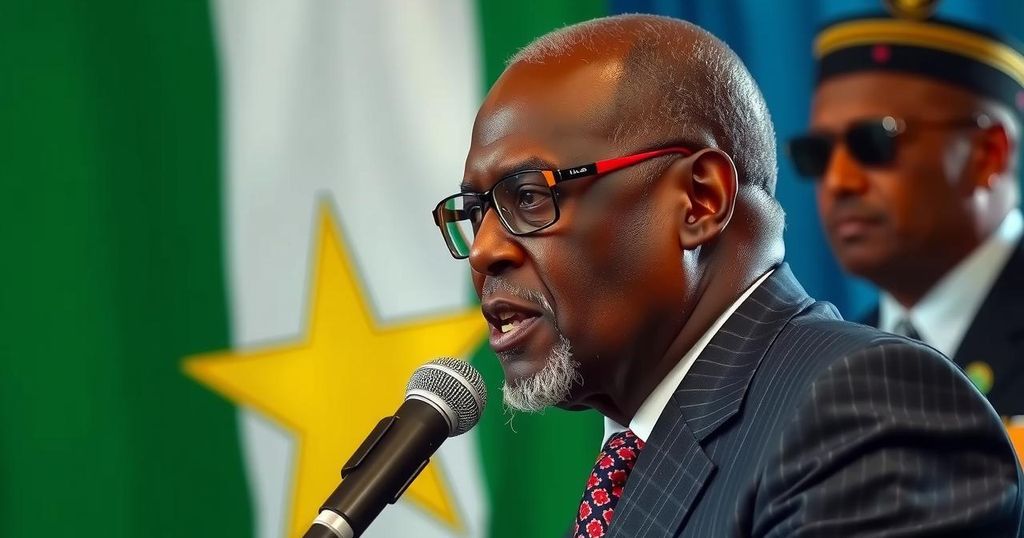Macky Sall’s Controversial Political Comeback in Senegal
Former Senegalese President Macky Sall is attempting a comeback by leading an opposition coalition from Morocco after a controversial election postponement. His return, met with skepticism due to past governance issues and tensions with rivals, raises significant concerns about the future of Senegal’s political landscape. Despite the potential risks, Sall remains determined to defend his legacy and achievements during his presidency.
In a surprising political maneuver, former Senegalese President Macky Sall, who resigned in April after a lengthy twelve-year tenure, is attempting a comeback by leading a newly formed opposition coalition, the Takku Wallu Senegal, from abroad. This decision comes amid a concerning political climate following his controversial postponement of this year’s presidential elections, which led to significant unrest across the nation. Now based in Morocco, Sall is positioning himself for a central role in the upcoming parliamentary elections, raising eyebrows about his motivations and the implications of his return on Senegal’s stability.
Sall’s exit from power followed an intense regime marked by social unrest and accusations of deteriorating public finances, as highlighted by his political adversaries. Current Prime Minister Ousmane Sonko has threatened potential legal actions against Sall and his administration for allegedly catastrophic financial practices that he believes have severely impacted Senegal’s economy. Political analysts assert that Sall’s return is strategic, aimed at safeguarding his legacy and interests amid looming political investigations.
The former President’s earlier governance was characterized by a standoff with Sonko, resulting in a crisis defined by a wave of violence and civil unrest. Sall’s successor, Bassirou Diomaye Faye, has struggled to gain public support, losing to Sonko’s former deputy in the recent elections, which have created a precarious political environment. As Sall re-emerges into Senegal’s political landscape, he faces significant challenges, including public discontent and the visceral wounds left from his administration’s authoritarian tactics against dissenters.
In his letter addressing the nation, Sall has contended that his participation is imperative to defend his governmental achievements against what he described as months of fraught governance by the new administration. This perspective has led to criticism from government officials, including presidential spokesperson Ousseynou Ly who denounced his actions as “indecent” given the unrest associated with his rule. Moreover, Sonko’s recent declarations of “high treason” regarding the state of public finances inherited from Sall’s administration complicate his re-entry into the political arena.
Despite Sall’s claim that he is prepared for a safe return to Senegal, concerns about potential legal repercussions hang heavily in the atmosphere. Political experts posit that his desire to assert influence in the wake of perceived threats exemplifies a deeper ambivalence towards relinquishing power. Yet, it remains to be seen whether the Senegalese populace, aggrieved by his past, is willing to accept the former leader back into the political sphere.
Macky Sall served as the President of Senegal for twelve years, leaving a controversial legacy that includes a fraught relationship with his political adversaries, particularly Prime Minister Ousmane Sonko. His administration was marred by accusations of corruption and financial mismanagement, which have been cited as contributing factors to civil unrest. Following elections that led to significant public dissatisfaction with his hand-picked successor, Sall has sought to reclaim a role in Senegalese politics from overseas, raising questions about his motives and the impact on national stability.
The attempted political resurgence of Macky Sall from Morocco indicates a complex dynamic within Senegal’s political sphere, reflecting unresolved tensions from his presidency. As he leads the opposition coalition, Sall’s actions suggest a strategic effort to re-establish influence amidst accusations from his rivals. However, the serious public grievances stemming from his previous leadership present significant obstacles as Senegal navigates a path towards political stability and civic reconciliation.
Original Source: www.arabnews.com




Post Comment